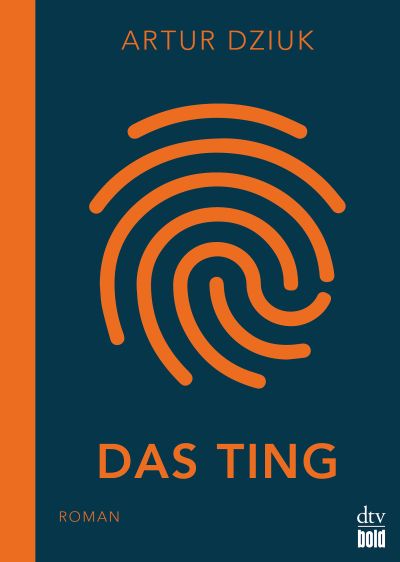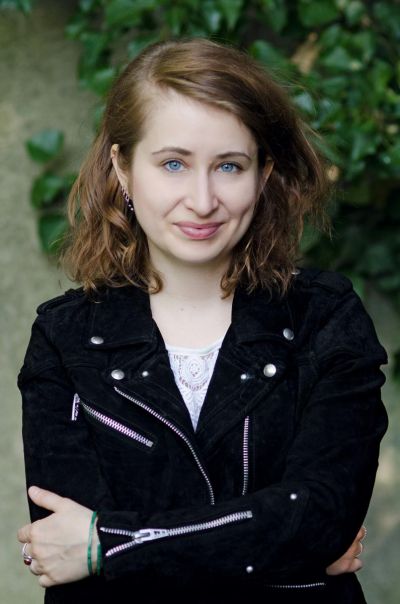Artur Dziuk

When Dziuk’s parents came to Germany from socialist Poland, where they had few prospects, his mother was 22 and his father 27 years old. Instead of their old jobs (teacher and auto mechanic), they began their lives in West Berlin with cleaning jobs and German courses. They were too busy with their integration to have more children; at least that’s how Artur Dziuk, who grew up without siblings, sees it in retrospect. Eventually, his father joined the Daimler production line, where today he works in a research department. His mother also carved out a career for herself: she trained to be an assistant tax consultant, studied business administration at night school, and is now a tax consultant with her own firm. Art and culture played no role in Dziuk’s parental home. He never saw his parents read any books. He, too, read very little in his youth. He was, however, an avid consumer of television series and video games and developed a fascination for stories and effective narrative techniques at an early age.
Then – towards the end of Dziuk’s adolescence – he experienced a transformation. Almost overnight, he became someone who read a lot and wrote regularly. Dziuk saw this as a chance to develop his own personality away from his parents and to avoid conforming to the cliché of the Polish immigrant: industrious, inconspicuous to the point of invisibility, and completely assimilated.
His love of reading awoke immediately after graduating from high school. Now literature was no longer subjected to the interpretation and evaluation constraints of German and English lessons. A new freedom emerged. His aunt was a role model for him. “I often visited her in Poland”, says Dziuk. “She read an incredible amount, and that impressed me even as a child.” The new passion developed almost into an obsession in Dziuk’s eyes: “As if I had to catch up on something.” Among Polish authors, he was initially captivated by Stanisław Lem, then Witold Gombrowicz, of whom he says: “It’s just impossible to read Gombrowicz and not relate to the texts.”
At the same time as Artur Dziuk developed from an infrequent to a prolific reader, he began to write down words, observations and thoughts in a notebook that he always carried with him. Taking a playful approach, he turned these notes into miniatures and short stories. One day, Dziuk realised that writing had become an integral part of his existence, in his words “a practice that is part of everyday life”.
His topics are usually contemporary phenomena that he cannot properly categorise and explain, which is precisely why he is unable to let go of them. He says: “For me, storytelling is a way of approaching such mysteries and finding a language for my questions.”
Artur Dziuk takes his own writing seriously from the very start, even if he occasionally views it from a different perspective and quite self-deprecatingly as a somewhat vain endeavour. He pursues a goal, albeit with detours: in 2008, Dziuk was awarded one of the coveted places on the Literary Writing programme at the University of Hildesheim. Before that, he had spent a year in a Japanese studies programme and then studied prehistory and early history up to Bachelor level. Dziuk was extremely active in the Hildesheim literary world. He was co-editor of Bella Triste, a magazine “for young literature” that enjoys considerable respect in the literary world, and became one of the artistic directors of Prosanova, a literature festival known throughout Germany. After six years, he completed his studies with a Master of Arts. The author describes his time in Hildesheim as very enriching: “Although writing may not have been the main thing I learnt there, being in a literary ecosystem around the clock made me think a lot about literature. And I spent more time talking about writing than ever before or since in my life.” Sometimes this motivated him, sometimes it inhibited him, but overall it was a very important period of his life, in which he was able to reflect thoroughly on his own work, develop an aesthetic practice, and respect himself as an author. In Hildesheim, Dziuk also embarked on his first major novel project. He continued working on it after graduating, financed by residency scholarships that took him to places such as Schöppingen and the Künstlerhaus Eckernförde. Eventually, he moved to Berlin for two years and finished his novel there. By this point, Dziuk had gained a name for himself in literary circles, not least because of his participation in the “Open Mike” literary competition. And he was lucky enough to get a literary agency interested in his project. Nevertheless, it was anything but easy to find a publisher for his novel, which, in Dziuk’s words, “sits between two chairs”. Eventually, he was offered a book contract with a renowned publisher: dtv bold belongs to the long-established dtv publishing house and is geared towards a young target group, which in Dziuk’s eyes suits ‘Das Ting’ very well.



